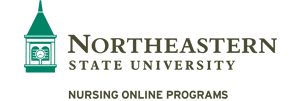It is not news that the United States has an opioid epidemic. In 2016, according to the Centers for Disease Control (CDC), there were more than 42,000 deaths from opioid overdoses. That is 115 deaths every day. Prescription opioids were involved in 40 percent of those deaths.
Opioid-exposed infants are unwitting victims of the epidemic. The American Academy of Pediatrics reports that up to 94 percent of newborns exposed to opioids in utero will develop withdrawal symptoms.
The National Academy of Medicine (NAM) — formerly the Institute of Medicine — has called for registered nurses (RNs) to achieve higher levels of education in order to meet today’s complex health challenges. Opioid addiction is certainly one example.
Northeastern State University (NSU) offers an online RN to BSN program that builds on the education and experience nursing students already have. RNs graduate prepared to meet the healthcare needs of the communities they serve.
What Are Opioids?
The CDC describes opioids as “a class of drugs used to reduce pain.” Some are legally prescribed. Others are illegally manufactured. What they have in common is that they are highly addictive. Categories of opioids include:
Prescription opioids: Methadone, oxycodone and hydrocodone are examples of prescription opioids. These drugs are prescribed to treat pain following surgeries and injuries. Prescription opioids are also used in the treatment of chronic pain, such as with osteoarthritis.
Fentanyl:This synthetic opioid pain reliever is approved for treating severe pain from diseases such as with cancer. However, illegally manufactured fentanyl is responsible for most overdoses in the U.S. Illegally produced fentanyl can be combined with heroin and/or cocaine with or without the user’s knowledge.
Heroin: Use of this illegal opioid is increasing sharply among groups that previously had low rates of use, including women and those with higher incomes.
Looking at the numbers in a single state (Oklahoma) illustrates the cost of the opioid addiction crisis.
- According to the Oklahoma Department of Mental Health and Substance Abuse (ODMHSA), Oklahoma has surpassed every other state when it comes to nonmedical use of prescription painkillers.
- In one county, 95 percent of inmates have a history with opioid abuse.
- The Oklahoma Bureau of Narcotics reported 899 deaths from drug overdoses in 2016, with 435 prescription opioid-related drug overdose deaths. Compared with 2007, this is a 68 percent increase.
- The ODMHSA estimates that addiction costs the state of Oklahoma $7.2 billion annually.
What Role Do Nurses Play in the Opioid Epidemic?
RNs practice in a wide range of healthcare settings and play a key role in responding to the opioid crisis. Nurses are often the first to connect with patients. This places them in a unique position to help identify when there is a problem (or the potential for a problem) with opioids. As patient advocates, RNs are well-positioned to help prevent problems with opioid prescriptions.
One of the most significant ways RNs can reduce the risk of opioid addiction is through patient education. Informing postoperative patients of the importance of safe storage of pain medications, for example, can help prevent drug “diversion.” This is the use of legally prescribed controlled substances that were prescribed to another person.
RNs with the appropriate education can also recognize risks, such as with post-op patients who may have a history of substance-use disorders. As trusted patient advocates, RNs are in a good position to connect patients to community resources as well.
Finally, nurses play an important role in the treatment of newborns exposed to opioids in utero. Using an approach called Eat, Sleep, Console (ESC), RNs can reduce the need to medicate as well as shorten hospital stays. Teaching parents to use the same “common sense” approach to soothing their babies can also improve bonding and help keep moms and babies together, which may be the best treatment of all.
The opioid epidemic is a complex problem, with multiple risk factors, particularly “adverse childhood experiences” (ACE). Individuals who experienced trauma in childhood, such as emotional and physical abuse, may be more likely to use illegal drugs and prescription pain medications in the future. Advanced education can equip nurses with the professional skills and knowledge they need to respond to this healthcare crisis.
Compassion is equally important when it comes to caring for those with addictions. Most who struggle with addiction have tremendous shame. Empathy is an important quality in RNs, and it can go a long way in recognizing when something is going on for a patient. The good news is that with the proper care, prevention is possible, as is recovery.
Learn more about NSU’s online RN to BSN program.


